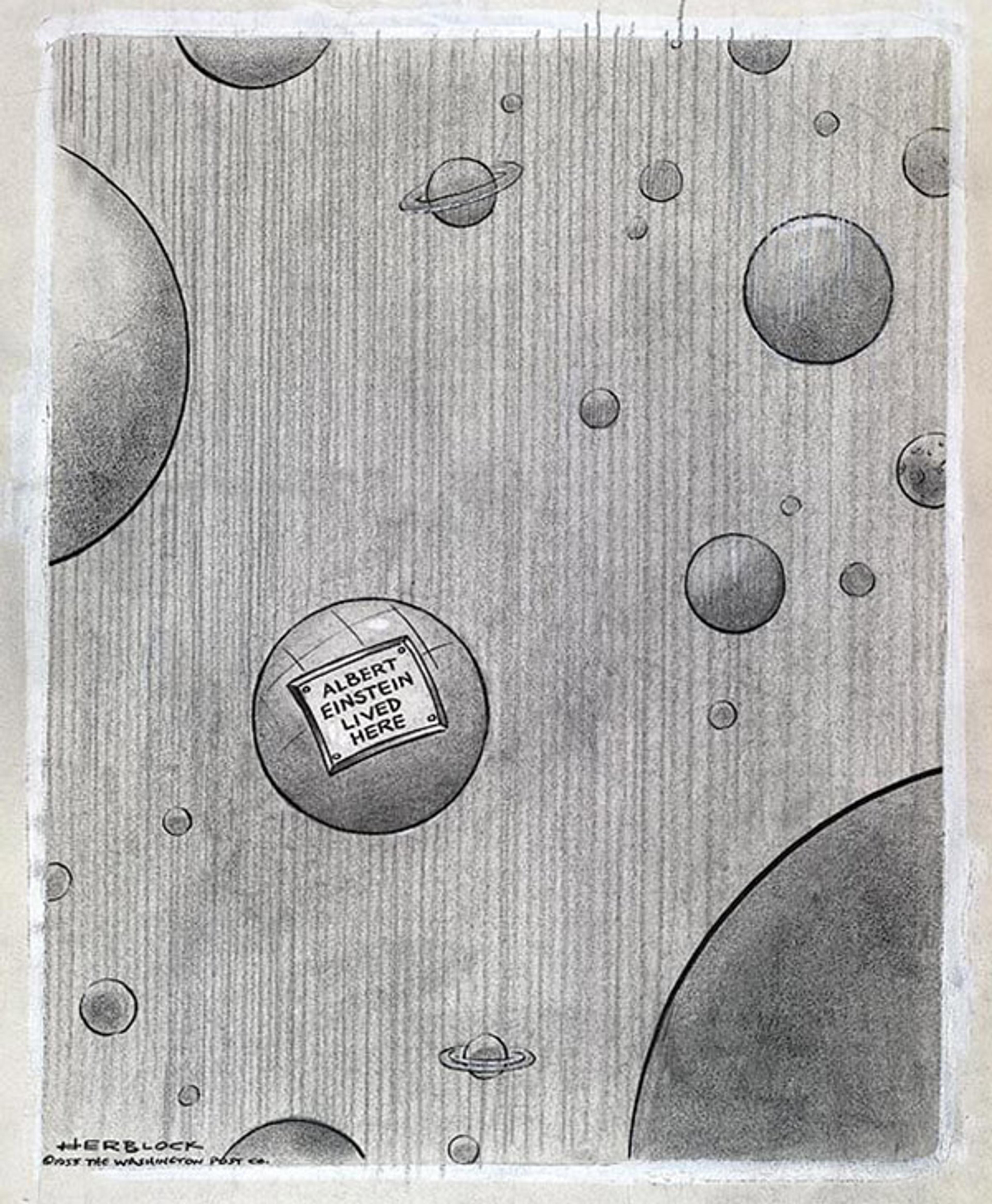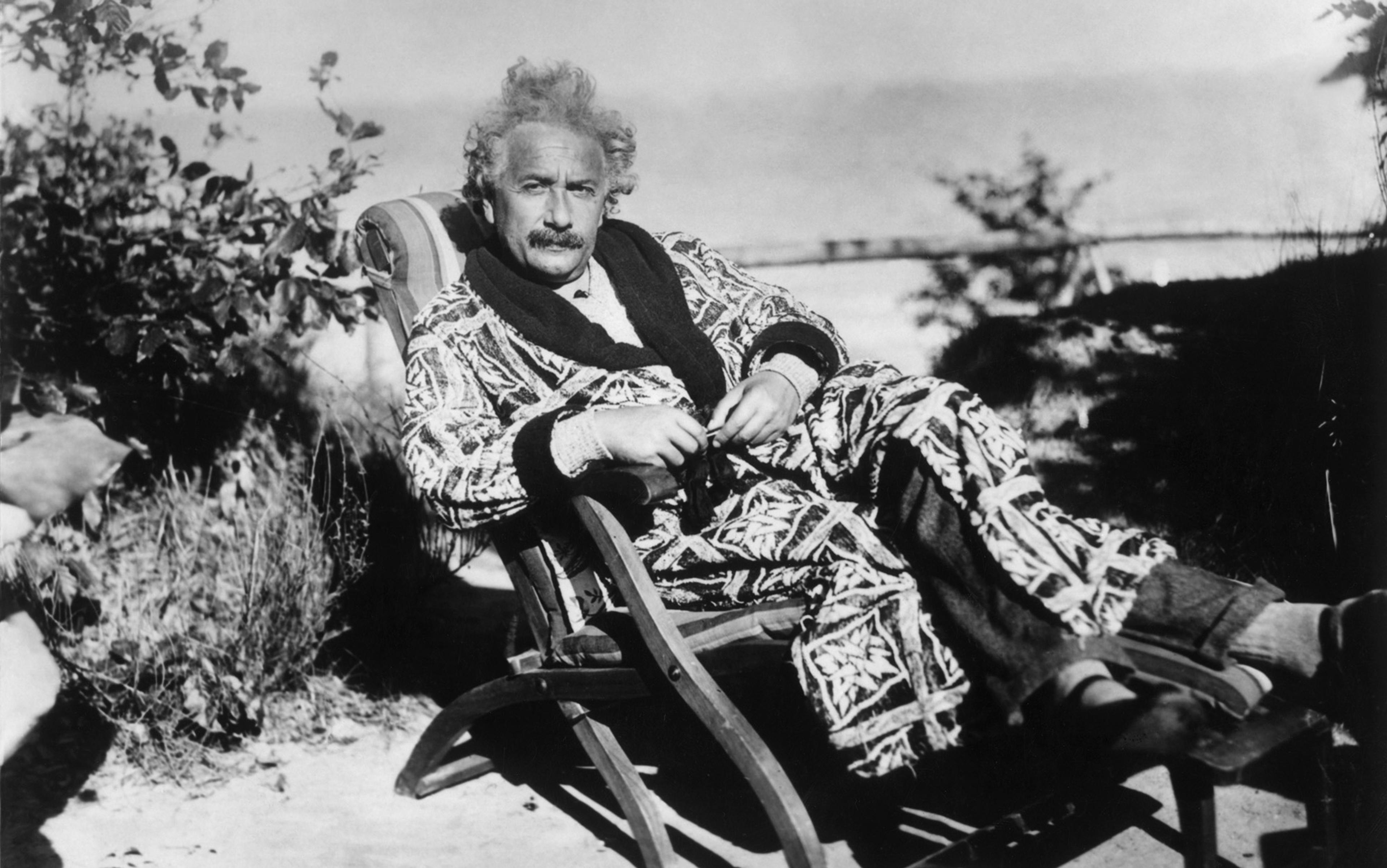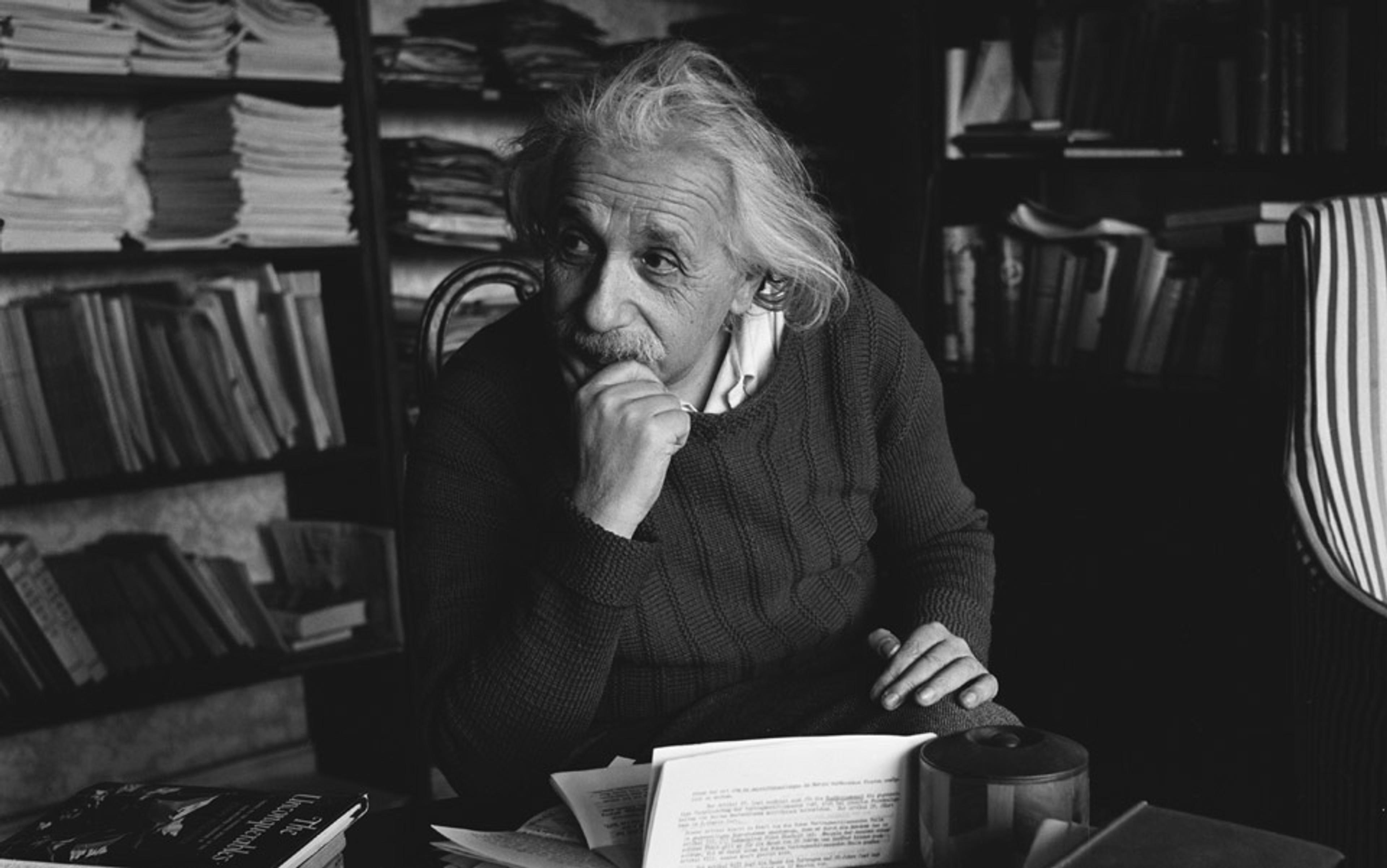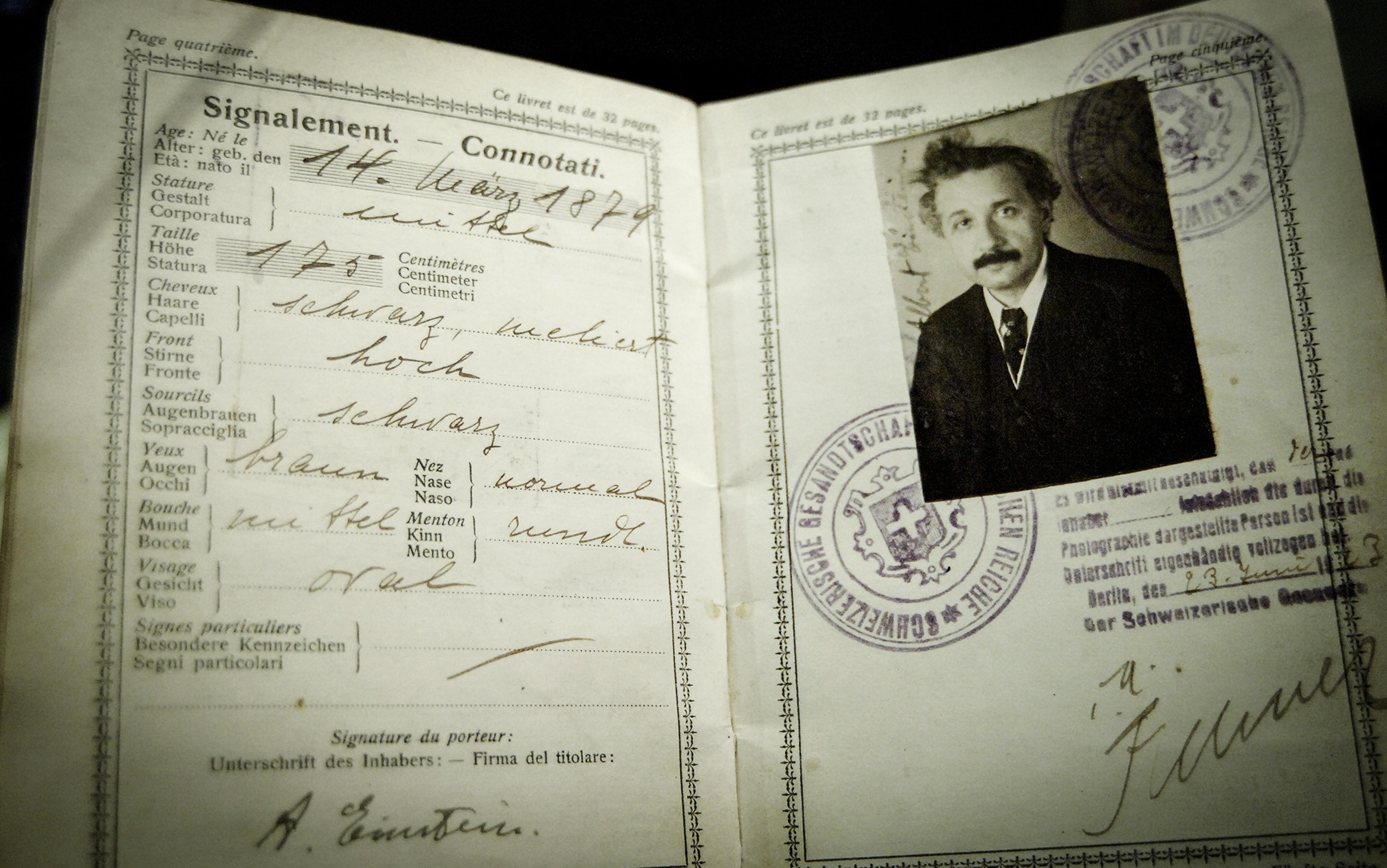In late 2017, a sheet of paper bearing a 13-word sentence in German in the original handwriting of Albert Einstein went on sale at an auction house in Jerusalem. The city is home to the archives of Einstein, which he willed before his death in 1955 to the Hebrew University, the institution that he helped to found in the 1920s. The Albert Einstein Archives now contain some 30,000 documents. Several times the size of Galileo Galilei’s and Isaac Newton’s archives, they rival the archives of Napoleon Bonaparte. However, the provenance of this particular paper had nothing to do with the Archives, despite a copy of it being held in the collection. It was decidedly more intriguing.
The paper was inscribed and autographed in Japan on the stationery of the Imperial Hotel in Tokyo and dated November 1922, the month in which Einstein was awarded the Nobel Prize in Physics. He stayed at this hotel during his massively popular lecture tour of Japan, when he attracted even more attention than the Japanese imperial family. Apparently somewhat embarrassed by such frenetic publicity, Einstein decided to record some of his thoughts and feelings about life in writing. He gave this particular sentence (and another shorter one) to a Japanese delivery courier, either because the courier refused to accept a tip, in keeping with local practice, or because Einstein had no small change. ‘Maybe if you’re lucky those notes will become much more valuable than just a regular tip,’ Einstein apparently told the unnamed Japanese courier, according to the document’s seller, reported by the BBC to be the courier’s nephew.
The Jerusalem auction house estimated that the note would sell for between $5,000 and $8,000. Bidding started at $2,000. For about 20 minutes, a flurry of offers pushed up the price rapidly, until the final two bidders vied for the trophy by telephone. By the end, the price had risen to a scarcely believable $1.56 million.
Translated into English, Einstein’s sentence reads: ‘A calm and modest life brings more happiness than the pursuit of success combined with constant restlessness.’
The absurdity of this auction would not have been lost on Einstein, were he still with us. During the second half of his life, following the British-led astronomical confirmation of his theory of general relativity in 1919, he was unfailingly puzzled by his celebrity and uninterested in amassing money for its own sake. He was happiest when left alone with his mathematical calculations or with a select handful of fellow physicists and mathematicians – in Zurich, Berlin, Oxford, Pasadena and Princeton. On the long sea journey from Europe to Japan and back, he loved to retreat into his cabin and scribble mathematical equations.
As Einstein wrote of his celebrity in a preface intended for a biography of himself, written by the physicist Philipp Frank:
I never understood why the theory of relativity with its concepts and problems so far removed from practical life should for so long have met with a lively, or indeed passionate, resonance among broad circles of the public … I have never yet heard a truly convincing answer to this question.
And, as he mused on the meaning of life to Life magazine just before his death in 1955:
Try not to become a man of success but rather try to become a man of value. He is considered successful in our day who gets more out of life than he puts in. But a man of value will give more than he receives.
Einstein’s death was universally covered. The New York Times carried tributes from the presidents of the United States and West Germany, and the prime ministers of Israel, France and India. Prominent intellectuals who had known Einstein personally chimed with the politicians. ‘For all scientists and most men, this is a day of mourning. Einstein was one of the greats of all ages,’ stated J Robert Oppenheimer, the US physicist who had directed the building of the atomic bomb in the Second World War. The Danish physicist Niels Bohr, who had disagreed with Einstein over quantum theory, wrote:
The gifts of Einstein are in no way confined to the sphere of science. Indeed, his recognition of hitherto unheeded assumptions in even our most elementary and accustomed assumptions means to all people a new encouragement in tracing and combating the deep-rooted prejudices and complacencies in every national culture.
According to the British philosopher Bertrand Russell:
Einstein was not only a great scientist, he was a great man. He stood for peace in a world drifting towards war. He remained sane in a mad world, and liberal in a world of fanatics.
Today, Einstein is history’s most-quoted scientist: way ahead of Aristotle, Galileo, Newton, Charles Darwin and Stephen Hawking, judging by the number of Einstein quotations in his online entry on Wikiquote – and way ahead of his 20th-century non-scientist contemporaries Winston Churchill, George Orwell and George Bernard Shaw. Let me quote from The Ultimate Quotable Einstein (2010), published by Princeton University Press, the publisher of Einstein’s ongoing Collected Papers – an anthology now in its fourth and officially final edition: ‘There appears to be a bottomless pit of quotable gems to be mined from Einstein’s enormous archives,’ remarks the book’s editor, Alice Calaprice, in her introduction.

Herblock’s 1955 cartoon for the Washington Post. Courtesy Library of Congress
Unsurprisingly, Einstein is quoted as an authority on science. For example: ‘The most incomprehensible thing about the Universe is that it is comprehensible.’ But he is more frequently quoted on a wide variety of non-scientific subjects, including education, intelligence, politics (he was offered the presidency of Israel in 1952), religion, marriage, money and music-making. On education we get: ‘Education is what remains after you have forgotten everything you learned in school.’ On intelligence: ‘The difference between genius and stupidity is that genius has its limits.’ On politics: ‘Insanity is doing the same thing over and over again and expecting different results.’ On religion: ‘God does not play dice.’ On marriage: ‘Men marry women with the hope they will never change. Women marry men with the hope they will change. Invariably they are both disappointed.’ On money: ‘Not everything that can be counted counts, and not everything that counts can be counted.’ On music: ‘Death means that one can no longer listen to Mozart.’ And on life in general: ‘Things should be made as simple as possible but not any simpler.’
A number are simply bogus, invented to take advantage of his reputation as a genius and iconoclast
The last of these quotations recently filled an entire page of an in-house advertisement in Nature, where it was intended to promote the magazine’s news coverage of science as being neither specialised nor sensationalised. All of the quotations have appeared, and reappeared, in the world’s leading newspapers, and are extensively disseminated online.
But here we are making an assumption. Did Einstein definitely say or write the above statements? Judging by the detective work on display in The Ultimate Quotable Einstein, on Wikiquote and on QuoteInvestigator.com, plus my own research as an Einstein biographer, there is ample room for doubt. In fact, not a single one of the above quotations has been definitely attributed to Einstein, with the exception of ‘God does not play dice’! And even this is a pithy rendition of Einstein’s precise comment on quantum theory, in a 1926 letter to the physicist Max Born, where he wrote (in German): ‘The theory says a lot, but does not bring us any closer to the secrets of the “old one”. I, at any rate, am convinced that He is not playing at dice.’
Another statement: ‘If the facts don’t fit the theory, change the facts.’ This has been widely attributed to Einstein, including by Ivanka Trump, who Tweeted it and generated a brouhaha on the internet in 2017 by seeming to weigh in on the controversy over ‘fake news’ stirred by her father, President Donald Trump. Einstein might have been sympathetic to the statement’s underlying idea. In a well-known exchange with a student who, in 1919, following the confirmation of general relativity, asked: what if the astronomical facts had contradicted the theory? Einstein replied: ‘In that case, I’d have felt sorry for God, because the theory is correct’. But there is no record of Einstein’s making such a categorical statement in speech or in writing. Similar comments about facts and theories date from the 19th century; and this particular statement was not attributed to Einstein until 1991, in The Art of Computer Systems Performance Analysis by Raj Jain – and then without any source.
Now consider a statement prominently attributed to Einstein in the concluding section of a current British Museum exhibition on religion, ‘Living with Gods’: ‘The most beautiful and profound experience is the sensation of the mystical. It is the sower of all true science.’ Absent from The Ultimate Quotable Einstein, it seems to have been derived in the decades after Einstein’s death from the following comment, in his handwriting, spoken by him in 1932 for a recording issued by the German League for Human Rights. Translated from Einstein’s original German it reads: ‘The most beautiful and profound experience is the feeling of mystery. It underlies religion as well as all deeper aspirations in art and science.’ Note the most significant modification: ‘mystery’ in 1932 has become ‘mystical’ by 2018.
In other words, quotations from Einstein vary vastly in authenticity. Many can be traced to his writings; some are based on the recollections of those who knew him well; some have mutated over time; some resemble his thinking, or seem consistent with his personal behaviour but are not really his. And a number are simply bogus, invented to take advantage of his reputation as a genius and iconoclast – one being a notorious Einstein quotation apparently embracing astrology as ‘science’. As Calaprice observes: ‘Some sound genuine, some are apocryphal, and others are no doubt fakes, created by those who wanted to use Einstein’s name to lend credibility to a cause or an idea.’
So why are we still fascinated enough by Einstein to embroider, and even manufacture, extensive quotations from him? The answer must be as diverse, complex and unique as the man and his life, but is surely rooted in Einstein’s scientific genius. Consider this irresistible anecdote about Einstein, caught in the late 1930s in the very act of thinking, and recalled by one of his physicist assistants, Banesh Hoffmann:
When it became clear, as it often did, that even resorting to German did not solve the problem, we would all pause, and then Einstein would stand up quietly and say, in his quaint English: ‘I vill a little t’ink.’ So saying, he would pace up and down or walk around in circles, all the time twirling a lock of his long, greying hair around his forefinger … A minute would pass in this way and another, and Infeld [another assistant] and I would eye each other silently while Einstein continued pacing and all the time twirling his hair. There was a dreamy, far-away, and yet sort of inward look on his face. There was no appearance at all of intense concentration. Another minute would pass and another, and then all of a sudden Einstein would visibly relax and a smile would light up his face. No longer did he pace and twirl his hair. He seemed to come back to his surroundings and to notice us once more, and then he would tell us the solution to the problem and almost always the solution worked.
It is easy to understand Einstein’s profound appeal to scientists. In its special issue on Einstein for the centenary of special relativity, Scientific American estimated that two-thirds of the ‘crackpot missives’ sent to scientists and science magazines relate to Einstein’s theories. Either the writer claims to have found a unified theory of gravity and electromagnetism, where Einstein failed, or the claim is to have proved Einstein’s ideas, especially relativity, wrong. (The other third of the missives concern perpetual-motion machines and infinite-energy sources.)
But there must be much more to Einstein’s appeal, which goes far beyond the world of science, than his great thinking power. In 2005, Arthur C Clarke – whose own writings and personality reached well beyond readers and cinemagoers who like science fiction – put Einstein’s enduring global fame down to ‘the unique combination of genius, humanist, pacifist and eccentric’. While Newton, for example, is a household name, how many advertisers would think to use his image – as they frequently do Einstein’s – to promote a product for the general public, except perhaps apples? No politician is likely to drop Newton’s name in a speech, and Newton is seldom quoted outside a scientific context. Of course, Newton biographies continue to be written, but Newton does not pop up in newspaper headlines, cartoons and ordinary conversation. There are only a handful of well-known anecdotes about Newton, and no Newton jokes. One cannot imagine a popular book entitled ‘The Quotable Newton’.
The closest Einstein came to an ad hominem attack was the sardonic comment: ‘Blush, Born, blush!’
Newton is celebrated for his scientific achievements, for which all subsequent physicists, especially Einstein, have continued to revere him. But after Newton departed Cambridge and moved to London, in 1696, he left behind not a single friend in the place where he had spent 35 years and done his revolutionary work; there is not one surviving letter written by him to any of his Cambridge acquaintances between 1696 and his death in 1727. His successor as Lucasian professor of mathematics, William Whiston, wrote of Newton in his memoirs (long after his patron’s death): ‘He was of the most fearful, cautious and suspicious temper that I ever knew.’ As Jacob Bronowski rightly said in his book The Ascent of Man (1973): ‘Newton is the Old Testament god; it is Einstein who is the New Testament figure … full of humanity, pity, a sense of enormous sympathy.’
Einstein and Newton shared a great deal in their scientific work, but had very little in common as human beings. For all Einstein’s skepticism about personal relationships and institutional life, his two unsuccessful marriages and family tragedies (his second son, Eduard, spent his last three decades in a Swiss mental hospital), he was frequently highly sociable. He was a regular public speaker, kept up a vast correspondence with friends, colleagues and strangers, and made constant efforts to help scientific ‘rivals’ and newcomers – for example, the then-unknown Indian mathematician Satyendra Nath Bose, with whom he created Bose-Einstein statistics.
Unlike Newton, Einstein’s disagreements over science and all other matters – except anti-Semitism and Nazism – were conducted without polemic, and usually without rancour. There is no malice even in his long and inconclusive battle with Bohr over quantum theory. Einstein hit hard but not in order to wound. Arguing with his close friend Born on the same subject in the 1940s and ’50s, the closest Einstein came to an ad hominem attack was the sardonic comment: ‘Blush, Born, blush!’
In addition, almost all the public causes that Einstein supported were admirable and far-sighted. Many required moral courage. He stood up to be counted – and attacked – against anti-Semitism, segregation and the lynching of black people in the US; against the witch-hunts of McCarthyism, the build-up of the military-industrial complex, and against the drift towards nuclear war, at a time when few of these causes was either fashionable or ‘respectable’. Instead of basking in his fame and enjoying himself with physics, music and sailing, Einstein fought oppression wherever he thought his name and reputation might have a desirable impact. One cannot say that his various interventions were decisive, but there is ample testimony that he gave hope to the persecuted and influenced public debate. The very fact that J Edgar Hoover, director of the FBI, was determined to ‘get’ Einstein as a Communist sympathiser in 1950-55 shows just how seriously Einstein’s activism was taken by reactionary forces.
It’s worth noting that Einstein was himself inspired by Mahatma Gandhi, and he shared Gandhi’s indifference to material success – though he rejected Gandhi’s view that civil disobedience could be weaponised against the Nazis. In 1952, Einstein called Gandhi ‘the greatest political genius of our time’. Gandhi proved ‘of what sacrifice man is capable once he has discovered the right path. His work on behalf of India’s liberation is living testimony to the fact that man’s will, sustained by an indomitable conviction, is more powerful than material forces that seem insurmountable.’
Einstein’s answer to religion, which was tantamount to sacralising the scientific endeavour, has been taken seriously across the religious spectrum. In 2004, the biologist and militant atheist Richard Dawkins wrote that:
Einstein was profoundly spiritual, but he disowned supernaturalism and denied all personal gods … I gladly share his magnificently godless spirituality. No theist should presume to give Einstein lessons in spirituality.
The physicist Hawking revealed a similar outlook to Einstein’s when he wrote in 1984:
It would be perfectly consistent with all we know to say that there was a Being who was responsible for the laws of physics. However, I think it could be misleading to call such a Being ‘God’, because this term is normally understood to have personal connotations which are not present in the laws of physics.
And Pope John Paul II, speaking in 1979 on the centenary of Einstein’s birth to a meeting of the Pontifical Academy of Sciences, said he was:
Filled with admiration for the genius of the great scientist, in whom is revealed the imprint of the creative spirit, without intervening in any way with a judgment on the doctrines concerning the great systems of the Universe, which is not in her power to make, the Church nevertheless recommends these doctrines for consideration by theologians in order to discover the harmony that exists between scientific truth and revealed truth.
How much do artists revere him? During Einstein’s lifetime, Max Brod – Franz Kafka’s literary executor – wrote a novel, his most famous work, Tycho Brahe’s Path to God (1915), in which the character of Kepler was closely based on Einstein, whom Brod came to know in Prague in 1911-12. Brod commented that Einstein ‘time and again filled me with amazement, and indeed enthusiasm, as I watched the ease with which he would, in discussion, experimentally change his point of view, at times tentatively adopting the opposite view, and viewing the whole problem from a new and totally changed angle’. William Carlos Williams, E E Cummings and the Czech writer Karel Čapek, have all mentioned Einstein in their works. In Bertolt Brecht’s play Life of Galileo (1943), Brecht called himself the ‘Einstein of the new theatrical form’. Since Einstein’s death, he has made notable appearances in Friedrich Dürrenmatt’s play The Physicists (1962), Philip Glass’s opera Einstein on the Beach (1976), and in the physicist Alan Lightman’s novel Einstein’s Dreams (1992).
‘I like quoting Einstein. Know why? Because nobody dares contradict you’
As for the more subtle influences of Einstein’s ideas on artists, attempts have been made to link him with the works of, among other modernist writers who use multiple viewpoints, T S Eliot, Virginia Woolf and Lawrence Durrell. But as the authors of the study Einstein as Myth and Muse (1985) admit, there is no clinching evidence. Referring to Durrell’s Alexandria Quartet (1957-60), Alan Friedman and Carol Donley comment honestly: ‘Simply because writers say they are using relativity … does not mean either that they understand it or that their adaptations of relativity principles succeed artistically.’ By the same token, the historian of science Arthur Miller’s book-length study Einstein, Picasso: Space, Time, and the Beauty that Causes Havoc (2001) tries to link relativity with cubism, arguing that Einstein, like Pablo Picasso, was motivated to undermine the understanding of reality that constituted classicism. This, in spite of there being ample evidence that Einstein’s tastes in the arts were largely classical.
It is tempting to recall here Einstein’s comment on the philosophers of relativity: ‘the less they know about physics, the more they philosophise’. And perhaps also the physicist Paul Dirac’s unintentionally amusing warning about trying to link science and art: ‘In science, one tries to tell people, in such a way as to be understood by everyone, something that no one ever knew before. But in poetry, it’s the exact opposite.’
The phenomenon of Einstein misquotation is largely driven by an all-too-human desire for mystification and for authority figures, epitomised by the two words ‘iconic’ and ‘genius’. When relativity first became popular in the 1920s, many people assumed that Einstein could be cited to the effect that everything is relative, including truth; that all observations are subjective; and that anything is possible. ‘I like quoting Einstein,’ as the Jewish-American author, historian and broadcaster Studs Terkel declared with a grin in an interview with The Guardian on his 90th birthday in 2002. ‘Know why? Because nobody dares contradict you.’ Terkel’s quip is especially ironic, given Einstein’s lifelong distrust of authority – particularly in physics, education or politics. But even here, Einstein commands the last word. In an authentic aphorism for an unnamed friend, he wrote in 1930: ‘To punish me for my contempt of authority, Fate has made me an authority myself.’






